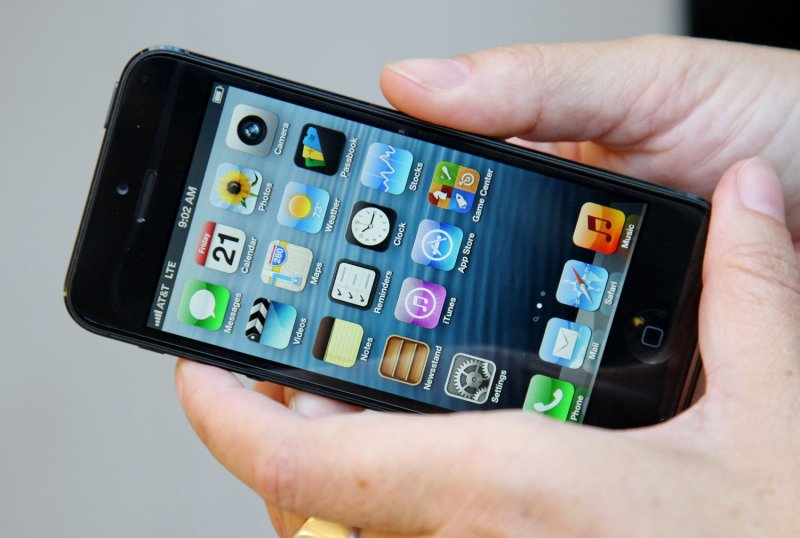1 of 5 | A customer holds a new iPhone 5 at the Apple Flagship Store on Fifth Avenue as the device goes on sale for the first time on September 21, 2012 in New York City. The new version of Apple's smartphone features a slimmer design, larger screen and a faster web browsing speed. UPI /Monika Graff |
License Photo
As on-line orders for Apple's iPhone 5 soared into the millions and the die-hard faithful set up sleeping bags and camp stoves in front of Apple retail stores in advance of Friday's opening sales day, it may be the time -- or at least the opportunity -- to ask a question: Does anybody really need an iPhone 5?
Not that need is necessarily a pertinent subject when it comes to Apple products, which seem to produce fervor beyond any possible practical benefit or service bestowed on the owner of one of the devices beyond what's offered by, say, any one of a number of Android smartphones.
As the snarky joke goes, "How can you tell if someone owns an iPhone? Easy, they tell you." At the first opportunity, usually.
But let's recast the question and broaden the inquiry a bit, to wit: Does anybody truly need to buy the latest smartphone from any manufacturer? Should they feel they're burdened with embarrassing obsolescence if they're walking around with a smartphone nearing the end of their carrier's contract, to wit: a 2-year-old device?
Lets' see, shall we. I have in my pocket -- well, I've put in on the desk for now -- a smartphone purchased in June 2010. The manufacturer isn't important, other than that it's not an iPhone, simply a representative of what a middle-range Android phone offered back then.
Processor speed? Just 600 MHz, well below the 1.2 gigaherz seen as the new minimum in phone horsepower.
OS? Android 2.3 "Gingerbread," several steps back from Android's current 4.1 "Jelly Bean" offering.
Screen size? 3.4 inches, while some new Android phones have gone well beyond 4 inches and even the iPhone 5 is bragging about its bigger screen.
So, obsolete?
If the verdict should be based on whether the phone can do what the new iPhone or any new top-of-the-line Android phone can do -- and let it be so decided -- the answer must be no.
Any task the typical smartphone owner might require -- and nowadays that's all about what a phone can do beyond simple calling and texting -- is still within the capability of almost any 2-year-old Android smartphone.
Navigate? Sure, it will run Google Maps.
Facebook access? On-line banking? Internet shopping? Camera? WiFi access? YouTube video watching? Yes.
Talk to your phone and have it talk back? Well, Apple touts its Siri voice assistant, but there are any number of Android equivalents, like Vlingo or Assistant, that will run fine on even a mid-level phone.
Play music? Yes (OK, it's not iTunes, but there are plenty of Android music apps and services out there.)
And no, you don't need this season's phone to play Angry Birds.
Does all this prove any particular point?
Perhaps not, but what it does do is raise a broader and possibly more important question regarding where smartphones have come from and where they are going.
Simply put, it's this: Is each new generation of smartphone still offering a revolutionary advance in technology and capability as we've been used to seeing, or has the curve leveled off to the point where we're now in a period of incremental, "evolutionary" improvement?
I would argue for the latter, and would present as Exhibit A my 2-year-old Android workhorse. A little slower than an iPhone 5 or a Samsung Galaxy S III, missing perhaps a bell here or a whistle there, but still a smartphone capable of what people use a smartphone for.
That's not to say an iPhone 5 or any latest-model Android phone isn't impressive. It's just that manufacturers have pushed the technology so far so fast it may take them a while to regroup and reconsider just where they need to go to come up for a phone that will reach the jaw-dropping, revolutionary, "wow, that's cool" level rather than just offering "new and improved" bells and whistles.
So go ahead, buy that iPhone 5 or the latest speed-demon Android handset if if makes you feel good.
But realize it's just a smartphone, just like mine is a smartphone. Just like a lot of -- even all -- smartphones.
Evolution, anyone?















